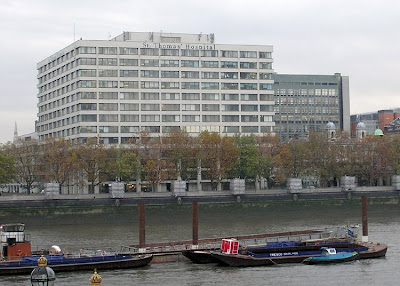One policy fits all
Dr Grumble has a Japanese doctor working with him. His name is Ren. The other day he asked Dr Grumble why there are so many parks in London. According to Ren, there are no parks in Tokyo. A quick Google search suggests that this might not quite be true and a look at Google maps seems to show a few patches of green in Tokyo. But a comparison with a map of London suggests that we do have much more green space. Ren asked why. Dr Grumble had to think on his feet. He told Ren it was to do with common land. Ren's face looked blank. Perhaps they don't have such a concept in Japan. Grumble needed a more understandable explanation. Quickly he made up a story about the king needing somewhere to go hunting. Ren nodded. That was something he could grasp.
Recently Dr Grumble went to his local forest to protest. He didn't want to risk the sale of the woods near his home to a private company. A forest is not worth much. Not as a forest anyway. But if you could sell it to be used for something else it would be worth quite a bit more. So, if the local wood were to fall into the hands of a private company, the shareholders would want to make money out of it. You can be sure that they would chip away at any regulations preventing them from doing this. They might not succeed tomorrow or in five years or in ten years but the woods need to be preserved forever. The likelihood is that repeated planning applications would eventually be met with approval for the odd plot of land to be sold off for, say, housing. In this way, bit by bit, over many years the woods would disappear. Once gone they would be gone forever.
Over the years how many people have fought for the green spaces in London? Dr Grumble has no idea. One thing is certain: if it had been left to the market the green spaces in London would have gone long ago. People out to make money have been been prevented from concreting over our parks and commons. That's why Grumble did his bit for posterity and protested in the woods.
And who knows? Maybe our London parks have made us money. Maybe that is partly why Japanese tourists like to visit London. Maybe the quality of life our parks and gardens bring even attracts bankers to London. Perhaps even they realise that there is more to life than money. We cannot know. And it doesn't matter. What matters is that we need these green spaces because we like them and governments have a duty to protect things of value to society especially when, once those things are gone, they are gone forever.
These fundamental principles don't just apply to the parks and gardens that we all cherish. There are other things in England that many of us value. There are others things that will be gone forever if we lose them. There are other things that we need to fight to protect. Just as some of us fought to protect the woodlands.
Here's an article from Sky News, slightly modified, to bring home something else we are about to lose forever:
Ministers have outlined proposals that will allow private owners to managelandhospitals previously owned by theForestry CommissionNHS. Some 15% of theforestNHS estate, worth an estimated £100mbillion, is already being sold.
The latest consultation could lead to the sale of the remaining 85% owned by theCommissionNHS, totalling2,500 sq km250 district general hospitals. Under the new proposalsancient woodland such as the Forest of Deanteaching hospitals such as Guys and St Thomas' could be designated'heritage forestry''National Training Centres' and transferred to be run by a charitable trust.
Campaigners inthe Forest of DeanLambeth have vowed to fight any plans to privatise or restrict access to theirwoodlandlocal hospital.Rich DanielsDr Grumble from theHands Off Our ForestSave Our NHS protest group, told Sky News the proposals raise more questions than they answer.
Commerically valuableforestshospitals will be leased to commercial operators for up to 150 years but under conditions that public benefits ofthe woodsuniversal healthcare are preserved.Environment Secretary Caroline SpelmanHealth Secretary Andrew Lansley stressed the plans were not about selling off theforestsNHS to the highest bidder.Ms SpelmanMr Lansley said: "State control offoreststhe NHS dates back to theFirst World War1947, when needs were very different. "There's now no reason for the Government to be in the business oftimber productionhealthcare andforestNHS management. "It's time for the Government to step back and allow those who are most involved with England'swoodlandshealthcare to play a much greater role in their future."
It would seem that the government has essentially one policy for everything. Everything should be privatised or charitised and government should take no responsibility for it. Government is no longer the custodian of things that we value. It is a new concept called the Big Society. What it really means is you are your own. Look after yourself and the things that you value because the government is not going to do it for you.
Why is the Labour Party not protesting? The answer is pretty obvious but if you can't work it out you may need the help of a Black Cat.











